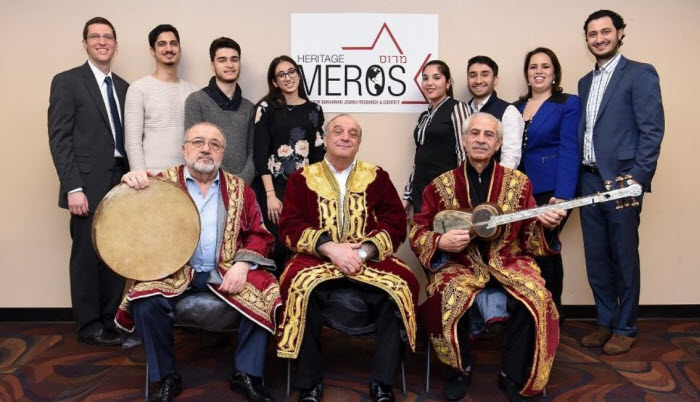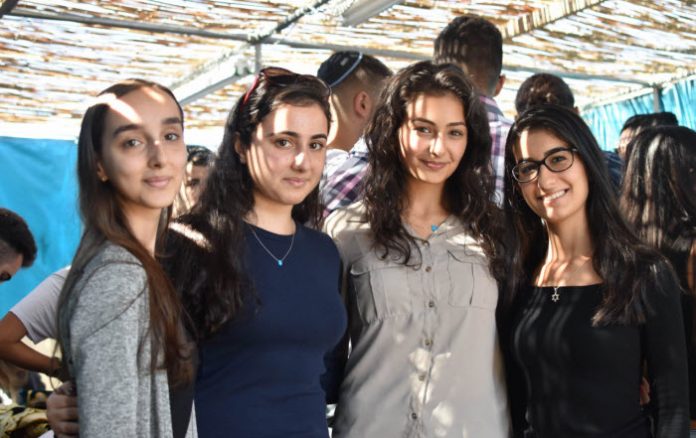Prior to my college years, I was only acquainted with a few Bukharian Jews my age. I was aware of my native culture and traditions, but I never understood their significance or origin. I thought I did certain things and thought a certain way simply because that’s how I was raised. It wasn’t until I was on the brink of adulthood as a college freshman that I began to embrace my heritage because it’s mine, and I became a champion for the Bukharian people on- and off-campus.
Bukharian Jews are a fairly new immigrant group. Most came to America in the 1990s, following the collapse of the Soviet Union, and settled in Queens, New York — in fact, there are now more Bukharian Jews living in Queens than in Bukhara itself. Prior to life in the United States, the Bukharian Jewish community lived along the Silk Road in Central Asia (Uzbekistan, Kazakhstan, Kyrgystan, Tajikistan and Turkmenistan) for more than 2,500 years — since the destruction of the First Temple in Jerusalem in 586 BCE.
The Bukharian community is very traditional, strongly family-oriented and deeply affected by the stresses of immigration. Though it has succeeded in building communal infrastructure like synagogues, schools, community programs and professional societies, it faces deep challenges including struggling to maintain its distinct Jewish identity, adapting to American cultural norms, the high costs of Jewish schooling, and what to do with children while both parents work long hours.
Initially, I assumed attending Queens College would be the typical commuter experience — go to school, go to work, go home. However, through an acquaintance, I was unexpectedly introduced to Hillel and realized the student organization offered me the opportunity to explore my curiosity and love for my Bukharian Jewish roots. Not only was I receiving a top-notch education that was preparing me for a career, but I also was growing personally, intellectually and spiritually. Now, I can proudly say: I am Jewish, I am Bukharian and because of my undergraduate experiences and research, I am in tune with my past, present and future.
Recognizing that Queens College has the largest Bukharian college student population in the United States, some of my fellow students and I decided we needed to form a club. Planning many events and activities highlighting Bukharian culture was often a challenge because the American way of life creates an environment that calls for assimilation as opposed to pride in one’s roots. For example, fewer new generation Bukharian Jews speak the languages their parents grew up speaking. But it is imperative that our youth hold onto its culture and traditions; as a group, our population is already fairly small as is!
I eventually took on the role of president of the Bukharian Cultural Club. Getting to work with others of Bukharian and Jewish descent also helped me better understand my heritage, but I also knew I had to do my own research if I wanted the club to not only be a social space but also a learning space. This wasn’t easy. I didn’t really know where to find information about Bukharian Jews. So, first thing I did was Google it. There were only a few resources online, none of which were particularly reliable. The books that I found were mostly written in Russian, and those that were in English were hard for me to get my hands on.
I kept imagining how nice it would be to have all of those resources in one place: books, articles, artifacts and cultural items, along with experts to help me understand the significance of each in general and to my life more specifically. In March 2018, my dream came into reality when we established the MEROS (heritage in Bukharian) center for Bukharian Jewish Research and Identity. Located within the Hillel space on campus, it is open to students as well as the public.

We host regular events, like the monthly “Choikhonas” (teahouse in Bukharian), highlighting different aspects of Bukharian culture. They have been a great reason for me to continue my search for resources and answers. While planning one particular Choikhona, I found a Bukharian cookbook on my mother’s shelves and brought it in to share with my peers. For another event, a colleague found an old dictionary filled with English, Hebrew, Russian and Farsi (a Persian dialect related to our Bukharian language). Until seeing that, I didn’t realize how rich our culture is. They say that the more you know, the less you know — and it’s certainly true in my case.
Since completing my undergraduate degree and moving on to graduate school, I have remained deeply involved in Bukharian Jewish campus life. I also have taken everything I learned and used it to become an active board member of the new Bukharian Jewish Union, a non-profit organization for serving a larger community of Bukharian Jewish young professionals in their 20s and 30s. I would love to someday create a foundation to support future generations of Bukharian Jews in their exploration of our heritage.
When I stepped on campus for the first time freshman year, I had no idea my involvement with student activities would lead me back to my heritage. My journey started with me not really understanding the significance of what it means to be a Bukharian Jew, and now I am helping others discover what it means for them as college students and as professionals.
I would encourage all Jewish college students who are at that turning point of rethinking what their heritage means to them to seek out the fellowship, opportunities, and resources available to them. College is when young people explore what it means not only to be a scholar but an adult. Being proud of my Bukharian and my Jewish heritage has strengthened my growth. It’s time to ask the questions and seek out the answers.
credit to forward.com










